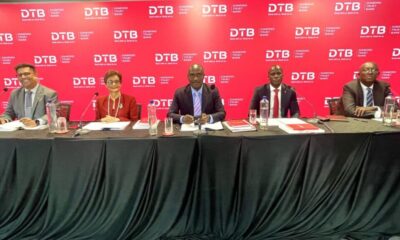CLIMATE CAPITAL
Patricia Ithau: CEO of WPP-Scangroup, Leading Africa’s Marketing Giant

: She leads WPP-Scangroup PLC, the largest marketing and communication group in sub-Saharan Africa, driving innovation, business growth, and social impact across the region.
Patricia Ithau leads WPP-Scangroup PLC, the largest marketing and communication group in sub-Saharan Africa. She took over as CEO on March 14, 2022, succeeding Bharat Thakrar at the helm of this Nairobi Securities Exchange-listed company.
Under her visionary leadership, WPP-Scangroup continues to redefine the marketing and advertising landscape in East Africa through a multi-agency, multi-disciplinary approach.
Her focus on pushing the boundaries of creativity and innovation has positioned the company to drive growth and deliver groundbreaking solutions across the region.
Early Life and Academic Foundation
Patricia’s leadership journey grew from a strong academic foundation.
Patricia Ithau studied at Loreto Convent Msongari in Nairobi before earning her Bachelor of Commerce degree from the University of Nairobi.
Further expanding her knowledge, she earned an MBA in Strategic Management from the United States International University-Africa.
She also completed advanced management programs at prestigious institutions like Strathmore University, IESE Business School, INSEAD, and Oxford University, laying the foundation for a distinguished career in business leadership.
Career Milestones: L’Oréal Africa and Beyond
Before joining WPP-Scangroup, Patricia was the founding CEO of L’Oréal Africa, where she significantly drove the company’s growth and success in the region.
Under her leadership, L’Oréal’s African subsidiary generated $25 million in annual revenue, employed over 270 people, and produced 40 million units annually.
One of her key achievements was leading one of the first acquisitions of a local business by a multinational in East Africa, demonstrating her ability to drive growth and market penetration in the competitive FMCG sector.
Advocacy for Women in Leadership
Patricia has actively championed women in leadership, advocating for creating opportunities that allow women to thrive in the corporate world.
As an Ambassador for the Women on Boards Network (WOBN) in Kenya, she has worked to elevate women into leadership positions.
She holds board positions at organisations such as ABSA Bank Kenya, Jambojet Ltd, Vivo Fashion Group, and the British Chamber of Commerce.
Furthermore, Patricia actively supports corporate governance and social impact as a Trustee for the Vodafone Foundation (UK) and the M-PESA Foundation.
Overcoming Personal Challenges and Building Resilience
In addition to her professional achievements, Patricia’s journey has been marked by resilience.
She was crowned Miss Kenya in 1986 during her first year at the University of Nairobi.
Navigating societal judgments and stereotypes during this period helped shape her leadership abilities, teaching her invaluable lessons in self-confidence and perseverance.
Recognition and Awards
Patricia’s contributions to Kenya’s economic growth and development have not gone unnoticed.
In 2020, she was awarded the Head of State Commendation (HSC) for her outstanding role in business development.
Patricia is also an accredited executive coach and certified Emotional Intelligence practitioner, emphasising her commitment to fostering future leaders who embrace emotional intelligence and holistic leadership practices.
Corporate and Social Impact
Patricia’s leadership extends beyond the corporate world.
As East Africa Regional Director for the Stanford Institute for Innovation in Development Economies (SEED), Patricia has driven sustainable business growth and job creation across sub-Saharan Africa.
Through SEED, she has supported over 200 businesses in tackling leadership challenges and fostering innovation, contributing significantly to the region’s economic transformation.
Family and Personal Values
Patricia is also deeply committed to her family.
She proudly raises her two daughters, Mueni and Makena, instilling in them the values of hard work and resilience.
Her role as a mother aligns with her broader mission of mentoring and guiding the next generation of leaders.
Conclusion: A Legacy of Leadership and Innovation
Patricia Ithau leads with vision, innovation, and a strong commitment to social sustainability, from her strategic achievements at L’Oréal Africa to her current role as CEO of WPP-Scangroup.
Her dedication to advancing women in leadership, her contributions to the business community, and her efforts in developing future leaders make her a lasting influence on Africa’s corporate sector, inspiring and driving progress across the region.
Celebrities & Sports
Bien Aime Baraza: Kenya’s Top Spotify Artist of 2024
Bien’s music blends heartfelt lyrics with vibrant African rhythms, creating a powerful emotional connection with listeners. His hit single Inauma deeply resonated with fans, addressing themes of heartbreak and resilience, while showcasing his ability to craft compelling, introspective narratives. This track, like much of his work, blends raw emotion with the energy of African musical traditions, making it a standout in his catalog.

: Bien Aime Baraza, top Spotify artist in Kenya 2024, stands out with his soulful R&B sound and solo career success. Discover his journey and music evolution.
Bien-Aimé Baraza, widely known as Bien, has redefined the Kenyan music landscape with his soulful sound and captivating storytelling.
Crowned Spotify’s top artist in Kenya for 2024, his music spans genres, blending Afropop, R&B, and Afro-soul, making him a standout both locally and internationally.
EARLY CAREER AND RISE TO STARDOM
Bien’s music journey began at Upper Hill High School, where he formed Sauti Sol in 2006 with Savara Mudigi, Polycarp Otieno, and Willis Chimano.
The group initially sang a cappella before evolving into a multi-award-winning band. Reflecting on those formative years, Bien said, “We started as a bunch of boys who just loved to sing. We had no idea it would grow into this phenomenon”.
His passion for music was further nurtured during his studies at the United States International University, where he pursued Journalism and Media Studies.
His storytelling abilities became central to his lyrical style, characterised by emotive narratives and catchy melodies.
BREAKING AWAY FROM SAUTI SOL
In 2021, Bien began exploring solo projects while remaining part of Sauti Sol. In 2023, the band announced a “temporary separation,” explaining that they wanted to pursue individual growth.
Bien remarked, “This isn’t the end of Sauti Sol; it’s an opportunity to rediscover ourselves and bring something fresh to the table.” This independence allowed Bien to delve deeper into personal projects, which included collaborations like Bald Men Love Better with Aaron Rimbui.
MUSICAL STYLE AND LATEST PROJECTS
Bien’s music combines a mix of poignant lyrics and vibrant African rhythms. His hit single Inauma resonated deeply with fans, tackling heartbreak and resilience.
In 2024, his COLORSxSTUDIOS performance of True Love further showcased his ability to bring raw emotion and soul to his music. Speaking about his craft, he said, “Music is therapy for me; it’s how I make sense of the world and connect with my fans”
WHAT SETS BEIN APART
What makes Bien unique is his authenticity and ability to address universal themes while rooted in African culture. Unlike many local artists, Bien often experiments with sound and visuals, as seen in his COLORSxSTUDIOS performance.
His willingness to collaborate with international platforms and artists highlights his global vision for Kenyan music.
LEGACY AND IMPACT
Bien continues to inspire, proving that Kenyan artists can excel on the world stage. As Monica Kemoli-Savanne from Spotify noted, “Bien’s success is a testament to the power of African talent and storytelling”.
Whether with Sauti Sol or as a solo artist, Bien remains a force in music, bridging cultures and redefining the African sound for global audiences
Startups & Funding
Top 10 Richest East Africans Under 30: Industries & Net Worth

: Discover the top 10 wealthiest East Africans under 30, their industries,
achievements, and estimated net worths. Learn about their remarkable journeys
to success.”

Kenneth M. Njeru (25, Kenya)
- Engagement: Founder of Africa Afya Healthcare, focusing on healthcare investment services and IT solutions for healthcare access improvement.
- Industry: Healthtech and healthcare investment.
- Net Worth: Not publicly disclosed but prominent in healthcare financing in Kenya

Ayushi Chandaria (26, Kenya)
- Engagement: Founder of Design Thinking Program, fostering innovation in education.
- Industry: Education and innovation.
- Net Worth: Not publicly disclosed but recognized for her impactful work in Kenya

Alex Mativo (29, Kenya)
- Engagement: Co-founder of E-LAB, Nanasi, and Duck, leveraging technology in multiple sectors.
- Industry: Technology and entrepreneurship.
- Net Worth: Estimated at several million USD due to diversified ventures
- .

Prisca Wegesa Magori (29, Tanzania)
- Engagement: CEO and Co-founder of TenTen Explore and Smart EFD, providing innovative software solutions.
- Industry: Technology and software development.
- Net Worth: Undisclosed but influential in Tanzania’s tech scene

Andrew Ddembe (28, Uganda)
- Engagement: Co-founder and CEO of MobiKlinic, providing mobile-based healthcare solutions.
- Industry: Healthtech.
- Net Worth: Not disclosed but a key figure in Uganda’s health innovation

Arooj Sheikh (28, Kenya)
- Engagement: Founder and CEO of Beyond Kenyan Bars, working on social justice initiatives.
- Industry: Social entrepreneurship.
- Net Worth: Undisclosed, focusing on impactful social change
- .

Hildah Magaia (29, Tanzania/South Africa)
- Engagement: Professional footballer for Mazatlán FC and Tanzania’s national team.
- Industry: Sports.
- Net Worth: Significant from sports and endorsements

Chad Jones (28, Kenya/South Africa)
- Engagement: Social media influencer and brand ambassador.
- Industry: Digital media and marketing.
- Net Worth: Not disclosed but has significant brand partnerships
These individuals have demonstrated remarkable entrepreneurship and talent across East Africa, contributing to industries like health, technology, education, sports, and tourism.
CLIMATE CAPITAL
Access Bank Secures CAK Approval for National Bank Acquisition

: Access Bank to acquire National Bank of Kenya for $100M, boosting market
share to 1.9% with CAK approval and workforce retention conditions.
CAK Approves Access Bank’s Acquisition of NBK with Conditions
The Competition Authority of Kenya (CAK) approved Access Bank’s acquisition of the
National Bank of Kenya (NBK) from KCB Group, requiring Access Bank to retain 80% of
NBK’s workforce for at least one year.
The Central Bank of Kenya (CBK) must now give its final approval for the deal.
Employment Retention Key to Approval
According to CAK, Access Bank must maintain 80% of NBK’s 1,384 employees and all
316 staff from its local subsidiary, Access Bank Kenya, for a year following the
transaction’s completion. “The transaction has been approved on condition that Access
Bank Plc retains, for one year, at least 80% of the target’s current workforce,” CAK
stated.
Deal Valuation and Finalization Timeline
While the deal’s value has not been disclosed, KCB Group announced in March 2024
that NBK would be sold for 1.25 times its book value. With NBK’s 2023 book value at
$79.77 million, the acquisition is estimated to be worth approximately $100 million. The
transaction is expected to conclude in November.
Expanding Access Bank’s Kenyan Presence
Access Bank’s current footprint in Kenya includes 23 branches in 12 counties. Acquiring
NBK’s 77 branches across 28 counties will significantly boost its presence and service
offerings, including retail, corporate, and Islamic banking. Access Bank, currently
ranked as a tier 3 lender, will integrate with NBK, a tier 2 institution, enhancing its status
in the market.
Market Share and Competition Analysis
The acquisition will give the merged entity a 1.9% market share in Kenya’s banking
sector. “The combined market size is unlikely to raise competition concerns since it is
low,” CAK noted. “The merged entity will face competition from other banks in the
market. Based on this, the transaction is unlikely to substantially lessen or prevent
competition.”
-

 Politics5 months ago
Politics5 months agoFred Okengo Matiang’i vs. President William Ruto: A 2027 Election Showdown
-

 Business & Money10 months ago
Business & Money10 months agoEquity Group Announces Kshs 15.1 Billion Dividend Amid Strong Performance
-

 Politics4 months ago
Politics4 months agoIchung’wah Faces Mt. Kenya Backlash Over Gachagua Impeachment Support
-

 Politics6 months ago
Politics6 months agoPresident Ruto’s Bold Cabinet Dismissal Sparks Hope for Change
-

 Politics7 months ago
Politics7 months agoPresident Ruto’s Lavish Spending Amid Kenya’s Economic Struggles Sparks Outrage
-

 Politics6 months ago
Politics6 months agoJohn Mbadi Takes Over Kenya’s Treasury: Challenges Ahead
-

 Business & Money2 months ago
Business & Money2 months agoMeet Kariuki Ngari: Standard Chartered Bank’s new CEO of Africa. What’s Next?
-

 Politics7 months ago
Politics7 months agoKenya Grapples with Investor Confidence Crisis Amid Tax Protest Fallout














